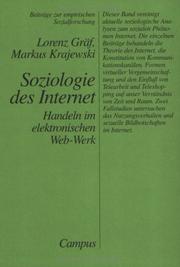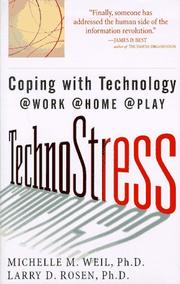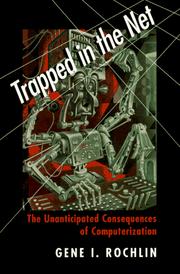| Listing 1 - 10 of 12 | << page >> |
Sort by
|
Dissertation
Year: 1997 Publisher: Mariakerke Arteveldehogeschool - bacheloropleiding grafische en digitale media
Abstract | Keywords | Export | Availability | Bookmark
 Loading...
Loading...Choose an application
- Reference Manager
- EndNote
- RefWorks (Direct export to RefWorks)
Electronic publishing --- Digitale media --- Grafische sector --- Industrie --- Prognose --- Statistische gegevens

ISBN: 3593357739 Year: 1997 Volume: 1996 Publisher: Frankfurt ; New York Campus verlag
Abstract | Keywords | Export | Availability | Bookmark
 Loading...
Loading...Choose an application
- Reference Manager
- EndNote
- RefWorks (Direct export to RefWorks)

ISBN: 0415197724 0415157854 9786610150816 0203981049 1280150815 113464194X 9780203981047 9780415157858 9780415197724 9781134641895 1134641893 9781134641932 1134641931 9781134641949 Year: 1997 Publisher: London ; New York : Routledge,
Abstract | Keywords | Export | Availability | Bookmark
 Loading...
Loading...Choose an application
- Reference Manager
- EndNote
- RefWorks (Direct export to RefWorks)
#SBIB:309H1710 --- #SBIB:309H103 --- #SBIB:AANKOOP --- Telematica, algemene werken --- Mediatechnologie / ICT / digitale media: sociale en culturele aspecten --- Information technology --- History. --- Forecasting. --- IT (Information technology) --- History --- Mass communications --- Technology --- Telematics --- Information superhighway --- Knowledge management --- Forecasting --- Information technology - History. --- Information technology - Forecasting.

ISBN: 0465036805 Year: 1997 Publisher: New York (N.Y.) Basic Books
Abstract | Keywords | Export | Availability | Bookmark
 Loading...
Loading...Choose an application
- Reference Manager
- EndNote
- RefWorks (Direct export to RefWorks)
Information technology --- Communication and culture. --- Information society. --- Technologie de l'information --- Communication et culture --- Société informatisée --- Social aspects. --- Aspect social --- #SBIB:309H103 --- Mediatechnologie / ICT / digitale media: sociale en culturele aspecten
Book
ISBN: 9029055391 Year: 1997 Publisher: Amsterdam Meulenhoff
Abstract | Keywords | Export | Availability | Bookmark
 Loading...
Loading...Choose an application
- Reference Manager
- EndNote
- RefWorks (Direct export to RefWorks)
Social change --- Computer. Automation --- #SBIB:309H103 --- #SBIB:309H1713 --- #SBIB:309H1015 --- Mediatechnologie / ICT / digitale media: sociale en culturele aspecten --- Mediatechnologie: nieuwe toepassingen (abonnee-televisie, electronic mail, desk top publishing, virtuele realiteit...) --- Media: politieke, juridische, ethische, ideologische aspecten (incl. privacy) --- 670 --- informatica --- computer --- informatique

ISBN: 0471177091 Year: 1997 Publisher: New York Wiley & Sons
Abstract | Keywords | Export | Availability | Bookmark
 Loading...
Loading...Choose an application
- Reference Manager
- EndNote
- RefWorks (Direct export to RefWorks)
Technology --- Stress (Psychology) --- #SBIB:309H103 --- Emotional stress --- Mental stress --- Psychological stress --- Tension (Psychology) --- Mental health --- Psychology --- Diathesis-stress model (Psychology) --- Life change events --- Type A behavior --- Social aspects. --- Psychological aspects. --- Mediatechnologie / ICT / digitale media: sociale en culturele aspecten --- Technology - psychological aspects --- Technology - social aspects --- Stress (Psychology). --- Technology - psychological aspects. --- Technology - social aspects. --- Psychological aspects --- Social aspects

ISBN: 1446280039 1857021932 144623312X 1282559672 9786612559679 0857021931 9780857021939 9781446280034 076195256X 9780761952565 076195256X 0761952578 9780761952565 9780761952572 Year: 1997 Publisher: London : SAGE,
Abstract | Keywords | Export | Availability | Bookmark
 Loading...
Loading...Choose an application
- Reference Manager
- EndNote
- RefWorks (Direct export to RefWorks)
This work considers the phenomenon of mass communications telecommunications and other media in varying international contexts: political, economic, cultural, technological military, legal and professional.
Communication, International. --- International communication --- World communication --- Communication --- 316.772.4 --- #SBIB:309H1710 --- #SBIB:309H1012 --- #SBIB:309H103 --- #SBIB:AANKOOP --- 316.772.4 Communicatie naar deelname, naar schaalgrootte--(communicatiesociologie) --- Communicatie naar deelname, naar schaalgrootte--(communicatiesociologie) --- Telematica, algemene werken --- Media: communicatiepolitieke aspecten / mediabeleid (nationaal en internationaal) --- Mediatechnologie / ICT / digitale media: sociale en culturele aspecten --- Mass communications --- internationale communicatie --- Communication, International --- Communication internationale

ISBN: 0803990863 Year: 1997 Publisher: Thousand Oaks (Calif.) Pine forge
Abstract | Keywords | Export | Availability | Bookmark
 Loading...
Loading...Choose an application
- Reference Manager
- EndNote
- RefWorks (Direct export to RefWorks)
Mass media --- Forecasting. --- History. --- Technological innovations. --- Mass communications --- #SBIB:309H1000 --- #SBIB:309H103 --- #SBIB:309H1016 --- #SBIB:309H1720 --- Media: algemene en theoretische werken --- Mediatechnologie / ICT / digitale media: sociale en culturele aspecten --- Media: socio-culturele aspecten (massamedia en maatschappij, met inbegrip van cultuurhistorische werken en werken over de maatschappelijke en politieke effecten van de (diverse) media) --- Informatiekunde, informatie management --- Mass communication --- Media, Mass --- Media, The --- Communication --- Forecasting --- History --- Technological innovations

ISBN: 0062514792 Year: 1997 Publisher: San Francisco, Calif. Harper Edge
Abstract | Keywords | Export | Availability | Bookmark
 Loading...
Loading...Choose an application
- Reference Manager
- EndNote
- RefWorks (Direct export to RefWorks)
Documentatiediensten--Industrie --- Informatiemaatschappij --- Information services industry --- Information society --- Informationsgesellschaft --- Services de documentation--Industrie --- Sociedade da informação --- Société de l'information --- Société de la connaissance --- Société du savoir --- #SBIB:309H103 --- #SBIB:309H1016 --- #SBIB:309H1713 --- Mediatechnologie / ICT / digitale media: sociale en culturele aspecten --- Media: socio-culturele aspecten (massamedia en maatschappij, met inbegrip van cultuurhistorische werken en werken over de maatschappelijke en politieke effecten van de (diverse) media) --- Mediatechnologie: nieuwe toepassingen (abonnee-televisie, electronic mail, desk top publishing, virtuele realiteit...) --- Information services industry. --- Information society. --- Information technology --- Social aspects. --- Sociology --- Information superhighway --- Service industries --- Social aspects --- Monograph

ISBN: 0691010803 0691002479 1400822262 9786612753220 1282753223 1400813158 9781400813155 9781400822263 9780691002477 1400817730 Year: 1997 Publisher: Princeton, N.J. Princeton University Press
Abstract | Keywords | Export | Availability | Bookmark
 Loading...
Loading...Choose an application
- Reference Manager
- EndNote
- RefWorks (Direct export to RefWorks)
Voice mail. E-mail. Bar codes. Desktops. Laptops. Networks. The Web. In this exciting book, Gene Rochlin takes a closer look at how these familiar and pervasive productions of computerization have become embedded in all our lives, forcing us to narrow the scope of our choices, our modes of control, and our experiences with the real world. Drawing on fascinating narratives from fields that range from military command, air traffic control, and international fund transfers to library cataloging and supermarket checkouts, Rochlin shows that we are rapidly making irreversible and at times harmful changes in our business, social, and personal lives to comply with the formalities and restrictions of information systems. The threat is not the direct one once framed by the idea of insane robots or runaway mainframes usurping human functions for their own purposes, but the gradual loss of control over hardware, software, and function through networks of interconnection and dependence. What Rochlin calls the computer trap has four parts: the lure, the snare, the costs, and the long-term consequences. The lure is obvious: the promise of ever more powerful and adaptable tools with simpler and more human-centered interfaces. The snare is what usually ensues. Once heavily invested in the use of computers to perform central tasks, organizations and individuals alike are committed to new capacities and potentials, whether they eventually find them rewarding or not. The varied costs include a dependency on the manufacturers of hardware and software--and a seemingly pathological scramble to keep up with an incredible rate of sometimes unnecessary technological change. Finally, a lack of redundancy and an incredible speed of response make human intervention or control difficult at best when (and not if) something goes wrong. As Rochlin points out, this is particularly true for those systems whose interconnections and mechanisms are so deeply concealed in the computers that no human being fully understands them.
Computer networks --- Computernetwerken --- Computers and civilization --- Computers en beschaving --- Computers--Netwerken --- Ordinateurs et civilisation --- Ordinateurs--Réseaux --- Réseaux d'ordinateurs --- Computers and civilization. --- Electronic data processing --- Computer networks. --- Informatique --- Social aspects --- Aspect social --- -#SBIB:309H103 --- #SBIB:309H1016 --- ADP (Data processing) --- Automatic data processing --- Data processing --- EDP (Data processing) --- IDP (Data processing) --- Integrated data processing --- Computers --- Office practice --- Civilization and computers --- Civilization --- Communication systems, Computer --- Computer communication systems --- Data networks, Computer --- ECNs (Electronic communication networks) --- Electronic communication networks --- Networks, Computer --- Teleprocessing networks --- Data transmission systems --- Digital communications --- Electronic systems --- Information networks --- Telecommunication --- Cyberinfrastructure --- Network computers --- Mediatechnologie / ICT / digitale media: sociale en culturele aspecten --- Media: socio-culturele aspecten (massamedia en maatschappij, met inbegrip van cultuurhistorische werken en werken over de maatschappelijke en politieke effecten van de (diverse) media) --- Automation --- Distributed processing --- Réseaux informatiques --- Social aspects. --- Réseaux d'ordinateurs --- Electronic data processing - Social aspects. --- #SBIB:309H103
| Listing 1 - 10 of 12 | << page >> |
Sort by
|

 Search
Search Feedback
Feedback About
About Help
Help News
News